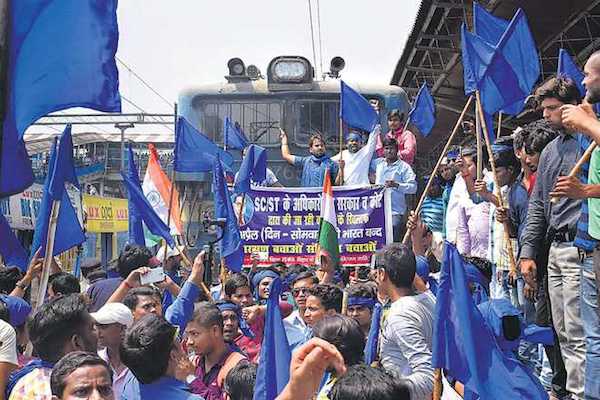
By SN Sahu
“In fact, Dalit anger can be best understood by understanding the neoliberal policies which has resulted in joblessness and job loss growth. The affirmative action taken to economically empower Dalits, subjected to centuries of exploitation and exclusion, is being weakened because of neo-liberalism, which marks the withdrawal of the State and the predominance of market and corresponding lessening of employment opportunities within the government for which the architecture of reservation policy is available. It is in the neoliberal era that a new system of employment in the form of contractual jobs has been created across the government departments and permanent jobs are shrinking at a rapid pace”,says the author.
There is widespread Dalit anger across the country (India) and it is mounting and spreading at an accelerated pace. It was manifested in the Bhima Koregaon incident a few months back. It arose out of the flogging of Dalit youths who were skinning dead cows in Gujarat. Now it is manifested in the Bharat bandh.
However, it is wrong to locate this anger only in the context of the bandh and the resultant unfortunate killing of seven precious lives and large-scale damage and devastation of property. While the violence during the bandh has been highlighted and flashed in the media, the corresponding media coverage of the atrocities committed on a day-to-day basis against Dalits even on such trivial issues as a Dalit mounting a mare on the occasion of his marriage are not adequate and widespread.
There are deeper and sensitive causes behind Dalit anger and it would not be fair to look at it merely in the context of the Bharat bandh called to protest against the dilution of the legislation designed to prevent atrocities on Scheduled Castes.
In fact, Dalit anger can be best understood by understanding the neoliberal policies which has resulted in joblessness and job loss growth. The affirmative action taken to economically empower Dalits, subjected to centuries of exploitation and exclusion, is being weakened because of neo-liberalism, which marks the withdrawal of the State and the predominance of market and corresponding lessening of employment opportunities within the government for which the architecture of reservation policy is available. It is in the neoliberal era that a new system of employment in the form of contractual jobs has been created across the government departments and permanent jobs are shrinking at a rapid pace.
Tragically, the policies of reservation are not applicable to such contractual jobs and, as a result, the Dalits, for whom the reservation policy enabled their access to jobs, have been denied employment in such contractual jobs which constitutes a mechanism to negate and dilute the affirmative action for Dalits. Both directly and indirectly, the system of contractual employment means de facto withdrawal of reservation of jobs for Dalits and other backward classes and sections of society. The job loss in the neoliberal economy is thus spelling troubles for the Dalits and stoking their anger. In fact, it constitutes the key reason behind the mounting Dalit anger in the country. It is rather unfortunate that this reason behind their anger has not been highlighted by the media.
The neoliberal policies have made quality education very expensive as it is now available mostly in private educational institutions which exact a heavy cost from those seeking access to such education. While the Chaturvarna system created opportunities for high castes to monopolize education, the neoliberal policy is enabling the high castes and wealthy to monopolize it in the 21st century on account of its prohibitively high cost.
Dr Ambedkar, while giving evidence before the Southborough Committee in 1919, had noted: “The growth of education, if it is confined to one class, will not necessarily lead to liberalism. It may lead to the justification and conservation of class interest; and instead of creating the liberators of the down-trodden, it may create champions of the past and the supporters of the status quo.” From his evidences, we find his interpretation that with the confinement of education to a few, a kind of nationalism would emerge which would produce a few men of sympathy.
In the neoliberal era marked by the monopolization of education by a few based on caste and wealth, we have today a few men of sympathy, protagonists of class interest, more people wedded to values which negate liberalism and perpetuate status quo. In such a situation, the Dalit anger will get multiplied as Dalits will continue to get victimized by the protagonists of status quo. Unless we take remedial measures, the Dalit anger which has taken a pan-Indian shape will cause a huge crisis, overwhelming the society and body polity. However, Dalit anger will have to be channelized by adopting constitutional methods as any other method, in the words of Dr BR Ambedkar, would spell grammar of anarchy.
Gandhi on Dalits
As early as 1926, Mahatma Gandhi wrote an article, “Crime of caste”, when a Dalit in a highly devotional and ecstatic mood entered a temple in South India and was caught by some caste Hindus and given to the police for prosecution. He was tried and fined Rs 75 for having offended his own religion by entering the temple which was prohibited to him. Luckily, because of arguments of a man like C Rajagopalachari, who appeared on behalf of the man who appealed against the fine, the punishment was set aside as the prosecution had forgotten to prove the insult in the lower court. Gandhi then put several questions, “What place shall the ‘untouchables’ occupy in our scheme of swaraj? If they are to be free from all special restraints and disabilities under swaraj, why can we not declare their freedom now? And if we are powerless today, shall we be less powerless under swaraj? We may shut our eyes and stuff our ears to these questions. But they are of the highest importance…. ” After 70 years of Independence, we are still grappling with such questions. They are of the highest importance to address the rising Dalit anger.
(The author is a Press secretary to former President, the late KR Narayanan)




Be the first to comment